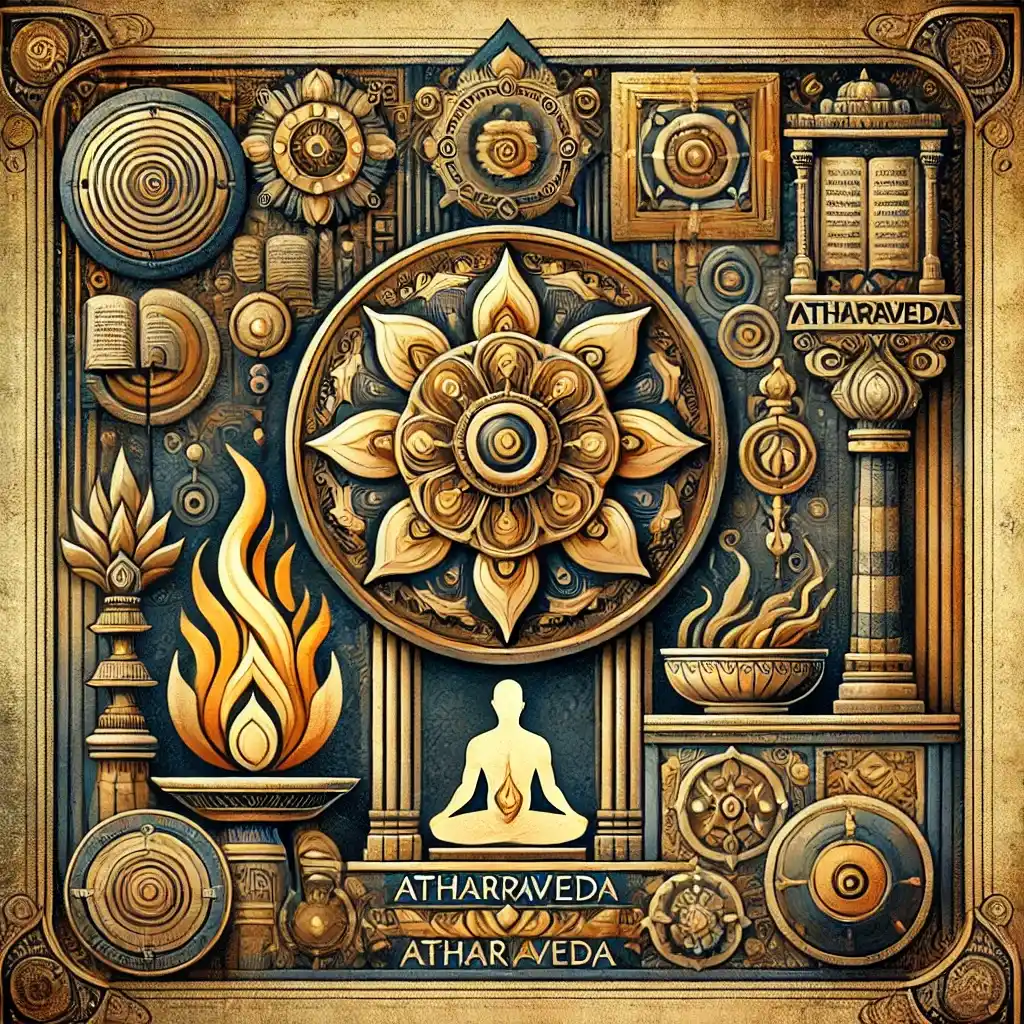
The Vedas
The Atharvaveda
The Veda of Knowledge and Wisdom
The Atharvaveda is one of the four Vedas, which are the ancient sacred texts of Hinduism. It is distinct from the other three Vedas (Rigveda, Samaveda, and Yajurveda) due to its unique content and approach. While the other Vedas focus primarily on rituals, hymns, and chants, the Atharvaveda delves into the realms of knowledge, wisdom, and practical life, covering a wide range of topics from healing practices to philosophical discourses.
Origins and Composition
The Atharvaveda is believed to have been composed around 1200 BCE, although it might include some older elements. The name "Atharvaveda" is derived from the Atharvans, a group of priests who were involved in the practices and rituals related to the Veda. Unlike the other Vedas, which were primarily associated with the Kshatriya and Brahmana classes, the Atharvaveda is often considered to have connections with the common people, addressing their day-to-day concerns and needs.
The Atharvaveda consists of approximately 760 hymns, with about one-sixth of the hymns borrowed from the Rigveda. These hymns are divided into 20 books, also known as kandas. The content of the Atharvaveda can be broadly categorized into two parts:
Magic and Rituals: This section includes hymns and spells related to healing, protection, and success in various endeavors. It also contains hymns that address social issues, such as love, marriage, and family life.
Philosophical and Spiritual Discourses: This section deals with more profound topics, including the nature of the universe, the concept of the soul (Atman), and the relationship between the individual and the cosmos.
Content and Structure
The Atharvaveda is often described as a mixture of poetry and prose, with a rich and diverse content that reflects the complexity of life in ancient India. Some of the key themes and topics covered in the Atharvaveda include:
Healing and Medicine: The Atharvaveda is sometimes referred to as the "Veda of Healing" because of its extensive focus on health, wellness, and medicine. It contains numerous hymns that deal with the treatment of various diseases, the use of herbs and plants for healing, and the protection against malevolent forces and spirits.
Magic and Superstition: The Veda includes spells and incantations designed to ward off evil, protect against enemies, and ensure success in love and marriage. These hymns reflect the ancient belief systems and practices that were prevalent during the time of its composition.
Philosophy and Spirituality: The Atharvaveda also explores philosophical questions about life, death, and the nature of the soul. It includes hymns that discuss the concept of Brahman (the ultimate reality) and the relationship between the individual self and the universal self.
Social and Domestic Life: The Veda provides insights into the social structure and domestic life of ancient India. It includes hymns related to marriage, childbirth, and the roles and responsibilities of individuals within society.
Political and Economic Matters: The Atharvaveda also touches upon topics related to governance, trade, and agriculture, reflecting the practical concerns of the time.
Atharvaveda and Its Place in Hinduism
The Atharvaveda holds a unique place in the Vedic tradition. While the Rigveda, Samaveda, and Yajurveda are primarily concerned with ritualistic worship and the performance of sacrifices, the Atharvaveda offers a more diverse and practical perspective on life. It addresses the fears, hopes, and aspirations of ordinary people and provides guidance on how to navigate the challenges of daily life.
The Veda also reflects the syncretic nature of ancient Indian religion, incorporating elements of magic, folk practices, and early philosophical thought. It is considered a bridge between the Vedic tradition and the later developments in Hindu philosophy, such as the Upanishads and the Bhagavad Gita.
Atharvaveda's Influence on Hindu Culture
The Atharvaveda has had a lasting impact on Hindu culture and practices. Its hymns related to healing and protection continue to be recited in various rituals and ceremonies. The Veda's emphasis on health and wellness also laid the foundation for the development of Ayurveda, the traditional system of medicine in India.
Moreover, the Atharvaveda's philosophical hymns have contributed to the rich tapestry of Hindu thought, influencing later philosophical texts and traditions. Its exploration of the nature of reality, the soul, and the cosmos has resonated with generations of thinkers and spiritual seekers.
Preservation and Transmission
Like the other Vedas, the Atharvaveda was preserved through an oral tradition, with priests and scholars memorizing and reciting the hymns to ensure their accurate transmission across generations. Over time, the Veda was written down, and various commentaries were composed to explain its complex and diverse content.
The Atharvaveda has been transmitted in two primary recensions, known as the Shaunakiya and Paippalada. These recensions differ slightly in content and organization, reflecting the regional variations in the practice and transmission of the Veda.
Atharvaveda in Modern Hinduism
In modern Hinduism, the Atharvaveda is less well-known than the other Vedas, but it remains an important part of the Vedic corpus. Its hymns are still recited in various rituals, particularly those related to healing and protection. The Veda's emphasis on practical knowledge and wisdom continues to resonate with people seeking guidance on how to lead a balanced and harmonious life.
The Atharvaveda also serves as a reminder of the rich diversity of the Vedic tradition, encompassing not only ritualistic worship but also practical knowledge, philosophical inquiry, and the exploration of the human experience.
Conclusion
The Atharvaveda is a fascinating and multifaceted text that offers a unique window into the life and thought of ancient India. Its combination of magic, healing, philosophy, and practical knowledge makes it a valuable resource for understanding the Vedic tradition and its influence on Hindu culture. As a testament to the complexity and richness of the Vedic scriptures, the Atharvaveda continues to inspire and guide those who seek wisdom and knowledge in the ancient texts of Hinduism.

Explore the latest and most popular products available on Amazon, handpicked for your convenience! Whether you're shopping for tech gadgets, home essentials, fashion items, or something special, simply click the button below to view the product on Amazon. We’ve partnered with Amazon through their affiliate program, which means that if you make a purchase through this link, we may earn a small commission at no extra cost to you. This helps support our site and allows us to continue providing valuable content. Thank you for your support, and happy shopping!